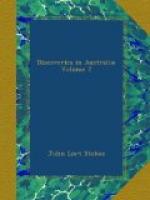Appearance of the natives.
It is to be regretted that our position would not allow us to seek the acquaintance of these people. I could not help comparing the bold, fearless manner in which they came towards us—their fine manly bearing, head erect, no crouching or quailing of eye—with the miserable objects I had seen at Sydney. I now beheld man in his wild state; and, reader, rest assured there is nothing can equal such a sight. Before me stood two of the aboriginal inhabitants of Australia who had never, until then, encountered the hitherto blighting look of a European.
After a long rest, we were enabled to move on again slowly in the cool of the evening, along the south bank of the river, followed by one of the native dogs, that differed only from those I had seen on other parts of the coast, in being rather larger.
Emu plains.
Two miles further brought us into a fine open plain, over which two emus were going best pace; we therefore named it in their honour: while the valley to the southward was christened after the Beagle, and the ranges on either side bore the names of her former and present commander: those to the north-east and south-west were called, after the officers who accompanied me, Forsyth and Bynoe Ranges. The soil on Emu Plains was far superior to any we had seen since leaving the boat, and was lightly and picturesquely timbered with the white gum. We were very cautious in choosing our sleeping berth for the night, to avoid a surprise during the dark; we therefore selected a friendly hollow beneath the stem of a straggling and drooping old gumtree, large enough to conceal the whole party, near the centre of a great patch of pebbles, with the river, on one side, within a hundred yards of us, and on the other, distant about three hundred.




